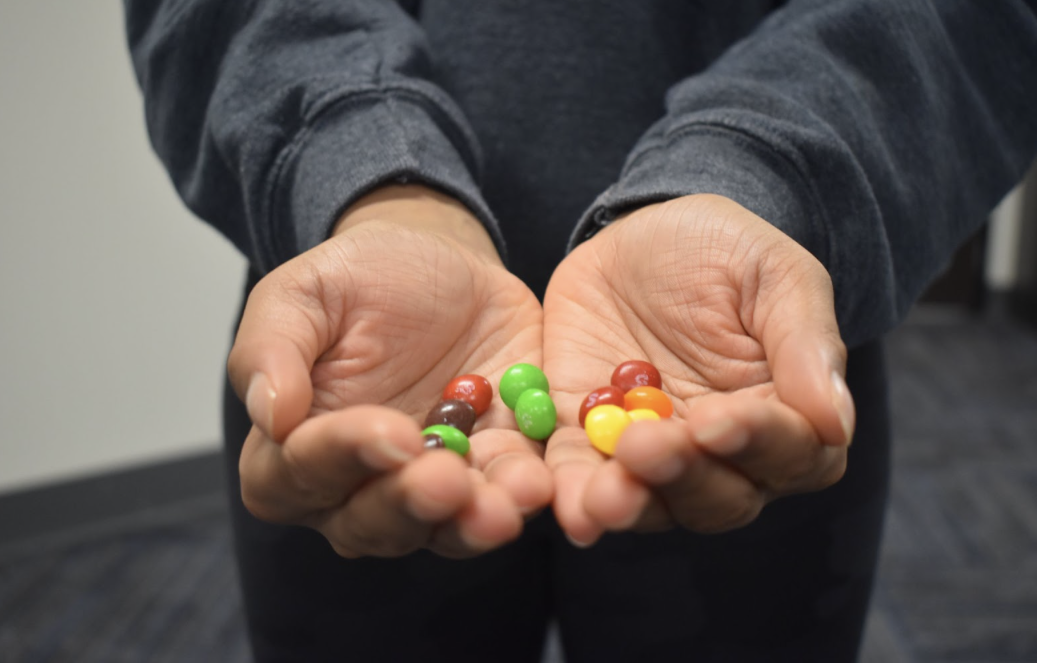In California, Assembly Bill 418 was recently passed to limit the consumption of dangerous ingredients such as brominated vegetable oil, potassium bromate, propylparaben and Red Dye No. 3. California Gov. Gavin Newsom ordered this ban, targeting Skittles and thousands of other foods, bringing forth conversations amongst students about the health value of foods they are consuming.
Expecting that businesses like Mars, which produce Skittles and other candies, will change and improve their products to be more health-friendly, Newsom has recognized that the bill was not a straight-out ban. Companies have until Jan. 1, 2027 to fix their products without having to pay a fee.Â
“I love Skittles so much and it [would] make me very sad [if] [the ingredients in] Skittles [were] going to be banned,” sophomore Kate Roland said.Â
This bill comes as several other countries have already addressed the issue. In Sweden and Norway, Skittles are completely banned in the midst of backlash against Yellow 5 and Yellow 6 dye. Furthermore, a lawsuit against Mars suggests that Skittles has an unhealthy amount of titanium dioxide, making it toxic and unfit for human consumption.Â
“If the product is dangerous, it should be banned. The company should find a way to fix Skittles and remove the red dye, so that people can still eat the candy,” sophomore Lily Overmann said.Â
These chemicals have been known to cause health issues in other products besides Skittles. Brominated vegetable oil has caused neurological problems when consumed in large amounts. Similarly, potassium bromate, known as the main ingredient in soft drinks, has posed a threat to hearing and kidney function.Â
“American food has a lot of work to do, and the amount of processed ingredients that we are eating is awful,” health teacher Jessica Wheeler said. “There’s a lot of cancers that are brand new which are linked to the introduction of a lot of processed foods over the past few years. It’s not just Skittles, it’s anything that’s found in aisles and in a box. It all needs to be reevaluated.”
By signing the ban of these ingredients into law, California became the first state to surpass the Food and Drug Administration through state action, creating a negative precedent for the administration. This ban has undermined the FDA as well as revealed other issues within the approval process.Â
The FDA system has been identified to have certain loopholes that allow products such as propyl paraben to be approved despite potential risks. Manufacturers can send in applications to deem ingredients in their product “generally recognized as safe” (GRAS). This loophole allows them to skip the FDA’s additive review process, and opens the products for general consumption.Â
Many manufacturers and companies have used this loophole and concealed information from their consumers on ingredient lists. All front-of-package (FOP) labels can give as much or as little information out about their products. Meanwhile, the back of labels can use umbrella terms such as “artificial flavoring” or “natural flavor” without specifying the exact ingredients.Â
“[Companies have] marketing schemes and [I teach students how to] make educated decisions based on the scheme. When something is fat free, there’s zero fat, but tons of sugar instead. I don’t think enough people understand that or care about it,” Wheeler said.



![Gazing up from the stage, junior Joseph McCurdy who played Peter Pan in the school play, Lost Girl, sits next to senior Juliana Rogers, who plays Wendy Darling, during a theater rehearsal. McCurdy’s passion for theater began when he observed a West High production in middle school. “I've been in the high school theater program since I was a freshman. I've always loved theater, but [what prompted me to join] was [when] I went to see [a performance here] when I was in middle school, and it was super cool,” McCurdy said.](https://pwestpathfinder.com/wp-content/uploads/2025/11/IMG_6535-1200x798.jpeg)

![Standing tall, stacked in a precise formation, the cheer team strikes a signature pose during halftime on Sept. 12 at the varsity football game. Nearly a month after this performance, the cheer team performed at the Missouri Cheerleading Coaches Association (MCCA) regional competition on Oct. 4, 2025. “We've all come [to] work together a lot more,” sophomore Elyssa Philippi said. “We're a lot closer than we were [earlier in the season] and going to state has made us closer [in] trying to work with each other, learn [new] skills and make our team better.”](https://pwestpathfinder.com/wp-content/uploads/2025/11/DSC5139-1.jpg)
![Handing out candy to excited trunk-or-treaters, President of the United Nations Children’s Fund club and junior Sara Ashok represents that group. Ashok was eager to participate in this event for multiple reasons. “I really wanted to be a part of the event because I get to help create memories for kids and spend time with my friends, spreading the things [I'm passionate about],” Ashok said.](https://pwestpathfinder.com/wp-content/uploads/2025/11/DSC_8648-1-1200x800.jpg)

![Smiling in a sea of Longhorns, Fox 2 reporter Ty Hawkins joins junior Darren Young during the morning Oct. 3 pep rally. The last time West was featured in this segment was 2011. “[I hope people see this and think] if you come to [Parkway] West, you will have the time of your life because there are so many fun activities to do that make it feel like you belong here. I was surprised so many people attended, but it was a lot of fun,” Young said.](https://pwestpathfinder.com/wp-content/uploads/2025/10/Edited2-1200x798.jpg)
![West High seniors and families listen as a representative of The Scholarship Foundation of St. Louis, Teresa Steinkamp, leads a Free Application for Federal Student Aid (FAFSA) workshop. This session, held in the library, provided guidance on financial aid, scholarships and student loan options. “This event is very beneficial for any seniors who are applying to or considering applying to colleges after high school [because] the cost of college is on the rise for seniors and parents,” college and career counselor Chris Lorenz said.](https://pwestpathfinder.com/wp-content/uploads/2025/09/DSC_4478-1200x778.jpg)
![Senior Kamori Berry walks across the field during halftime at the Homecoming football game on Sept. 12. During the pep assembly earlier that day, she was pronounced Homecoming Queen. “I thought it was nice that the crowd [started] cheering right away. I know [my friends] were really excited for me, and my family was happy because typically non-white people don't win,” Berry said.](https://pwestpathfinder.com/wp-content/uploads/2025/09/DSC7046-Enhanced-NR-1200x798.jpg)



